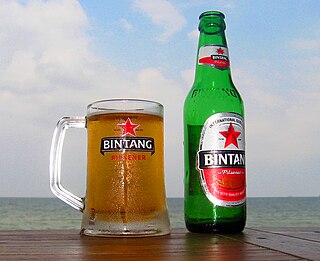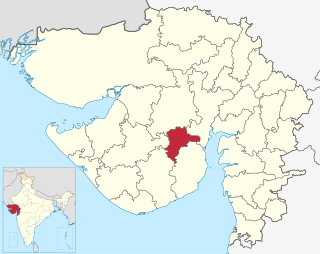Related Research Articles
Karnataka liquor deaths are deaths in Karnataka state in India in 1981 by consuming illegal liquor. In July 1981 about 308 people died in Bangalore by illicit liquor. Adulteration of cheap liquor by methyl alcohol resulted in deaths.
The Gujarat alcohol poisonings occurred in July 2009 in Gujarat, resulting in the death of 136 people from consumption of bootleg liquor.

Sale and consumption of alcoholic liquor for human consumption is prohibited in the states of Bihar, Gujarat, Mizoram, and Nagaland. All other Indian states and union territories permit the sale and consumption of alcohol.
The Sangrampur methanol poisonings occurred when a methanol-tainted batch of illegal alcohol killed 143 people at Sangrampur village in Magrahat I CD Block of Diamond Harbour subdivision in December 2011, affecting mainly manual workers of South 24 Parganas district in the Indian state of West Bengal.
The 2008 Karnataka-Tamil Nadu alcohol poisonings was an incident in the southern Indian states of Karnataka and Tamil Nadu in May 2008 in which 180 people reportedly died after consuming illicit liquor. This incident is considered to be the worst methanol poisoning in the country since at least 2000.
Cholai is an illegal alcoholic beverage made in India, equivalent to "hooch" or "bootleg" alcohol. Usually made from rice, it is sometimes mixed with industrial alcohol or methanol, which has resulted in several hundred deaths.
The Mumbai alcohol poisonings occurred in June 2015, when at least 102 people died after drinking contaminated alcohol in the Laxmi Nagar slum in Malad, located in Mumbai, India. Another 45 people were hospitalised as a result of the incident. The incident has been described as the worst of its kind in over a decade.

Alcohol in Indonesia refers to the alcohol industry, alcohol consumption and laws related to alcohol in the South East Asian country of Indonesia. Indonesia is a Muslim majority country, yet it is also a pluralist, democratic and secular nation. These social and demographic conditions led to Islamic parties and pressure groups pushing the government to restrict alcohol consumption and trade, while the government carefully considers the rights of non-Muslims and consenting adults to consume alcohol, and estimates the possible alcohol ban effects on Indonesian tourism and the economy.
In December 2016, over 70 people died of methanol poisoning in the Russian city of Irkutsk. Precipitated by the consumption of adulterated surrogate alcohol, it was the deadliest such incident in Russia's post-Soviet history.
In February 2019, at least 168 people died after drinking toxic bootleg alcohol in Golaghat and Jorhat districts in the Indian state of Assam. The incident occurred two weeks after 100 people died by drinking toxic alcohol in the northern states of Uttar Pradesh and Uttarakhand.
The 2020 Punjab alcohol poisoning was an incident in late July and early August 2020, where at least 100 people died after drinking illegally-made toxic alcohol in Punjab, India. Hundreds of raids were conducted in the three affected districts - Amritsar, Gurdaspur and Tarn Taran - along with several other places in and around the Rajpura and Shambhu border in Punjab. Forty people were arrested in relation to the incident. Seven excise officials, six policemen were also suspended over the incident.

On 25 July 2022, at least 42 people died and more than 97 were hospitalized in a methanol poisoning incident in Gujarat, India. The victims had consumed undiluted methyl alcohol (methanol), assuming it to be alcohol. The spurious liquor was then sold to more than 100 people in the villages of Ahmedabad, Botad and Surendranagar.

The Consequences of Prohibition did not just include effects on people's drinking habits but also on the worldwide economy, the people's trust of the government, and the public health system. Alcohol, from the rise of the temperance movement to modern day restrictions around the world, has long been a source of turmoil. When alcoholic beverages were first banned under the Volstead Act in 1919, the United States government had little idea of the severity of the consequences. It was first thought that a ban on alcohol would increase the moral character of society, but a ban on alcohol had vast unintended consequences.
On 14 December 2022, an alcohol poisoning took place in Bihar, India. The poisoning resulted in the death of 73 people. The victims consumed hooch, that is qualitatively different from the standard alcoholic products. It is the highest death toll in Bihar, since liquor prohibition in state in 2016.
The 2024 Tamil Nadu alcohol poisoning took place in Kallakurichi district in the southern Indian state of Tamil Nadu on 20 June 2024. Consumption of illegally made liquor resulted in at least 65 deaths and more than 200 injuries.

In November 2024, six people died from suspected methanol poisoning at a bar in Vang Vieng, Laos, as a result of consuming contaminated alcohol. At least six others were hospitalised.
The 2025 Istanbul alcohol poisonings refer to poisoning deaths related to bootleg alcohol consumption in Istanbul, Turkey in 2025. This included a surge of victims within a 72-hour period in January 2025, where at least 40 people died and 93 others required hospitalization, with at least 39 placed in intensive care. The deaths were attributed primarily to methanol poisoning from illegally produced alcohol.
References
- ↑ "Toxic Homemade Alcohol Kills Scores in India". The New York Times. 11 February 2019.
- ↑ "Toxic alcohol kills dozens in northern India". BBC. 15 February 2019.
- 1 2 "Deadly brew: At least 76 people die in India after drinking bootleg liquor". Washington Post. 10 February 2019.
- 1 2 Gupta, Swati; Suri, Manveena (14 February 2019). "Crackdown on illegal bootleggers after 80 die from toxic hooch in India". CNN.
- ↑ Kumar, Manish; Kaeley, Nidhi; Nagasubramanyam, Vempalli; Bhardwaj, Bharat Bhushan; Kumar, Subodh; Kabi, Ankita; Arora, Poonam; Dhar, Mridul (2019). "Single center experience of managing methanol poisoning in the hilly state of Uttarakhand: A cross sectional study". International Journal of Critical Illness and Injury Science. 9 (4): 172–176. doi: 10.4103/IJCIIS.IJCIIS_49_19 . ISSN 2229-5151. PMC 6927134 . PMID 31879603.
- ↑ "India: more than three dozen die in bootleg liquor poisoning". The Guardian. Associated Press. 9 February 2019.
- ↑ "Bootleg liquor kills scores in India". Deutsche Welle. 9 February 2019.